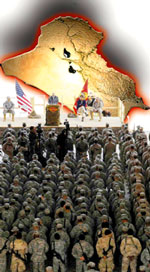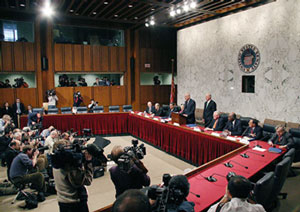News Analysis
Iraq report: ‘There is no path that can guarantee success’
- Bush calls for bigger military as Iraq war worsens (Army Times, 12-20-2006)
- Annan: Iraq worse than under Saddam (FCN, 12-20-2006)
- Bush has created a comprehensive catastrophe across the Mid-East (Guardian, 12-14-2006)
- Min. Farrakhan’s Press Conference on Iraq and ‘War on Terrorism’ (FCN Webcast, 05-03-2004)

Photo/Graphic: Harold Muhammad/D.O.D. Getty Images
THE WHITE HOUSE (FinalCall.com) – Led by President George Bush and his conservative allies, the United States is clearly trapped in an un-winnable war in Iraq, a point which is clear to mostly everyone now in Washington, except the President.
“We agree that victory in Iraq is important,” Pres. Bush insisted in the Eisenhower Old Executive Office Building Dec. 7, with British Prime Minister Tony Blair at his side. “It’s important for the Iraqi people, it’s important for the security of the United States and Great Britain and it’s important for the civilized world.”
His words came after a meeting with his closest foreign ally concerning the recently released Baker-Hamilton Iraq Study Group Report. His hope for “victory” is at odds with the report’s blunt conclusion.
“The situation in Iraq is grave and deteriorating. There is no path that can guarantee success, but the prospects can be improved,” says the report, authored by a bipartisan panel of senior former U.S. diplomats and lawmakers, and chaired by former Republican Secretary of State James Baker and former Democratic Congress member Lee Hamilton.
When asked by a BBC reporter if he might be “still in denial about how bad things are in Iraq,” the President snapped back almost indignantly: “It’s bad in Iraq. Does that help?”
“If the situation continues to deteriorate,” the authors write in their executive summary, “the consequences could be severe. A slide toward chaos could trigger the collapse of Iraq’s government and a humanitarian catastrophe.
“Our most important recommendations call for new and enhanced diplomatic and political efforts in Iraq and the region, and a change in the primary mission of U.S. forces in Iraq that will enable the United States to begin to move its combat forces out of Iraq responsibly.”
The report comes on the heels of a devastating electoral defeat for Republican House and Senate candidates, blamed in large measure on the Iraq war and the increasing erosion of support from lawmakers, senior retired (and even active duty) military personnel and diplomats. All that on top of countless warnings that Iraq would become an American “quagmire,” like the Vietnam war, even before the attacks on Baghdad began in March 2003.

Photo: KAREN BLEIER/AFP/Getty Images
“I think it’s clear the U.S. is stuck in Iraq,” Phyllis Bennis, a senior Fellow at the Institute of Policy Studies, told The Final Call. “It’s not only because of rejection of the recommendations of the Baker-Hamilton Iraq Study Group, because the Iraq Study Group did not call for ending the war. That’s the most important weakness of that report. It calls for essentially retooling the existing occupation into a smaller, perhaps in their view, more sustainable occupation, in which the number of U.S. casualties might drop, but there’s little concern for the fact that Iraqi casualties would very likely rise. It’s also a recipe for what amounts to a permanent occupation.”
There were ample warnings to Pres. Bush from the Honorable Minister Louis Farrakhan, among others, that there was much more suffering ahead for the Iraqi people and a disaster ahead for the U.S. In July 2002 from Baghdad on an international peace mission trying to avert the war, the Nation of Islam leader and a delegation reported about the conditions under which 5,000 Iraqis died every month as a result of U.S. sanctions that had been in place since the 1991 Gulf War.
Six months before, Minister Farrakhan warned Pres. Bush in a letter dated Dec. 1, 2001. “I respectfully say to you that I believe if you continue this effort in the way that you presently have in mind, it will not end terrorism but, unfortunately, may increase it.
“Afghanistan is only a preliminary to a much wider war, which is already planned, and this war also has a home front aspect as well. Should you persist in this, you will do what no Islamic Leader is able to do. You will unite the Muslim world in hostility against America and Great Britain, and you will use your great position of power, inadvertently to call for a Holy War against the West,” Minister Farrakhan wrote 16 months before the Iraq attack.
“The question is, who is George Bush listening to,” opined Ms. Bennis. “If he’s not even listening to the Baker-Hamilton commission with all of its oil representatives and representatives of the corporate-slash, government-slash, military-slash, economic elites of the United States on a bipartisan basis, the bottom line is that it represents a kind of consensus of elite opinion. And if he’s not even going to listen to that, it means that the American people have to really ratchet up our protest and demand that Congress take the lead.
“What Congress can do, they can’t give the commands to the troops, but they cut the purse-strings. That’s what brought the troops home from Vietnam; that’s what could bring them home from Iraq,” she argued.
Pentagon leaders as well as the Bush administration may be planning a permanent presence in Iraq, however. Ironically, incoming House Speaker-elect Nancy Pelosi (D-Calif.) was asked in July by The Final Call about whether the U.S. might be contemplating permanent military bases in Iraq. Rep. Pelosi, during the meeting with the Trotter Group of African American Columnists and Commentators, said she often raised that question during confidential Pentagon briefings. But “No comment” was the response she always received, she admitted.
Democrats–126 of whom voted in the House against authorizing U.S. military action in Iraq back in 2003–have already admitted, however, their reluctance to cut funding for the war, for fear they might be accused by Republicans of failing to “support the troops.”
The Palestinian-Israeli conflict is another stumbling block to U.S. disengagement from Iraq, according to the Study Group report. “The United States cannot achieve its goals in the Middle East unless it deals directly with the Arab-Israeli conflict and regional instability,” says the report. “There must be a renewed and sustained commitment by the United States to a comprehensive Arab-Israeli peace on all fronts: Lebanon, Syria and President Bush’s June 2002 commitment to a two-state solution for Israel and Palestine.”
Israeli Prime Minister Ehud Olmert told his cabinet Dec. 10 that the Iraq Study Group report should be treated as an internal American affair and ignored, according to Jerusalem News Wire.com. His ministers should avoid discussing the report, he contended. “We heard the position of President Bush and there is no need to add anything to that. I do not recommend comments on this sensitive topic.”
Many Israelis consider the report a “betrayal” by the U.S. while, on the other hand, most Arab observers have hailed it.
“This is consistent with the Israeli rejection of any kind of serious negotiations over ending (their) occupation (of Palestinian land since 1967),” said Ms. Bennis. “Israel wants negotiations with the Palestinians to be in the form of marching orders. We negotiate because we sit at the same table, and we’ll tell you what will be acceptable, and what will not. The same that the U.S. has in the view of how they will negotiate with Syria and Iran.”
At a press conference at the National Press Club in May 2005, Minister Farrakhan issued another warning, and recited his December 2001 letter and a second letter he wrote to Pres. Bush on Oct. 30, 2002, still four-and-a-half months before the attack.
“I am writing this letter to once again appeal to you in the strongest way that you might heed my humble counsel and sincere warning to you,” the Muslim leader bagan his second letter. “I warned that should you pursue what I know is in your mind and heart concerning Saddam Hussein and Iraq … the coalition would fall apart and you might be forced to go it alone. Also, I opined that if you did such, you might run into something that your advisors had not thought of or perceived. This is already happening. There is a rising chorus of anti-war demonstrations in the nation and throughout the world and it will intensify as you move toward war with the thought of occupying Iraq.”
“Mr. President, if you do this, you will bring down upon America an increase in the Divine Judgment of rain, hail, snow, wind, earthquakes, pestilence and famine that is already witnessed in the country,” he further warned. “As you go about destroying other nations and cities, you will bring this kind of Divine Wrath on the American people and on American cities. Please reconsider your plans.”












